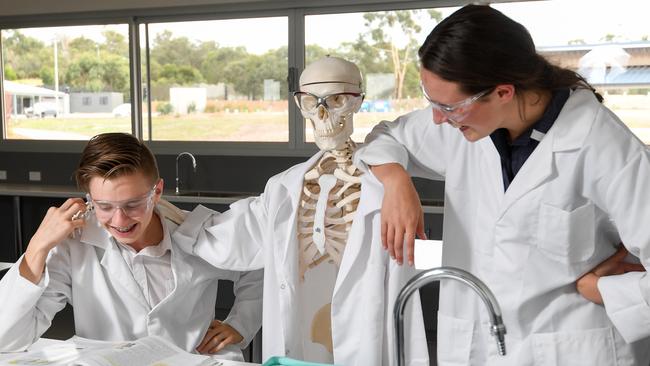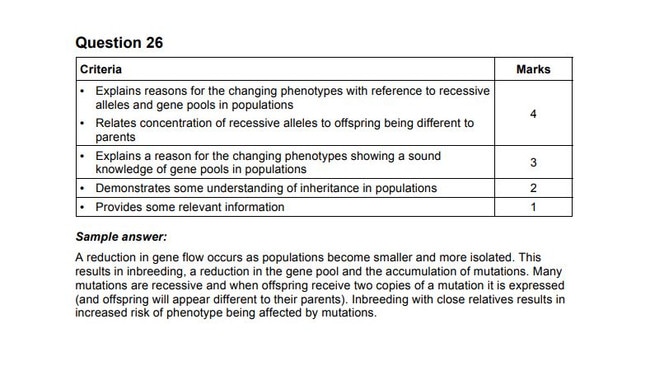HSC trials: Biology exam tips from top student
The secret to nailing the HSC Biology trial exam is knowing you’re not going to, says the state’s top student. See his tips to make the most of your study.

Education
Don't miss out on the headlines from Education. Followed categories will be added to My News.
HSC Biology exams consist of two parts – a 20-question multiple choice section, and a written response section where students may be asked to write a range of short to medium-length answers or draw diagrams and flowcharts.
Moriah College graduate Zane Simmons topped the lot in Biology last year, and told The Daily Telegraph the secret to nailing the trial exam is knowing you’re not going to – and that the HSC itself will likely be the easier of the two tests.
“The problem with trials is that you’ve only just finished all the content and then you have to go over everything you’ve learned in the last year when you really don’t have that much time.
“There’s a lot of topics in Biology and you might not have memorised it all yet, and often it’s a huge struggle during the trial period.”
Here are his tips for preparing for, sitting and revising after the HSC Biology trial exam.

BEFORE THE TRIAL
Study past marking guidelines, not just papers: The biggest issue with practice papers is that people will often not look at the marking guideline, and it’s a waste of time. You’re better off spending an hour and a half to two hours going through your exam and marking it yourself so you can understand exactly what the marker wants. Especially for Bio, the marking guidelines can be so, so specific and it sort of becomes a game of who knows the best what the markers are looking for.

Study in groups and teach your mates: There are some subjects where group study would be really unhelpful, but especially in Bio teaching your friends is a really good tool. When you’re the one receiving information you’re learning it, but then when you have to explain a topic to someone else, that measures how well you really know it. My friends and I would go through the syllabus dot point by dot point and just word vomit everything we knew about each one. It also helps you maintain a social life – being in the books all day every day is so counter-productive.
Memorise specific, cross-syllabus examples: This is quite specific to Bio, but a really good way of navigating the syllabus is to learn a lot of examples you can assign to multiple dot points. If you can remember a concept through an example, it helps with your knowledge of that content. For example, sickle cell anaemia can relate to the importance of polypeptide synthesis in module 5, point mutations in module 6, and then causes and effects of non-infectious diseases in module 8.
ON EXAM DAY
Take the exam front to back, in order: A lot of people will do the Bio exam backwards – start with the long response questions and then do the multiple choice at the end. I did it chronologically – the exam paper is written like that for a reason. Doing the multiple choice first gets you in the rhythm of everything, and you’re building up towards that last question.

Don’t waste time showing off: One thing I learnt from my trial is that time management is a big issue for me in Bio. In an exam at the beginning of the year I didn’t even get to the last 12-mark paper, which was a big wake-up call. Don’t dwell so much on the questions that you’re providing a superfluous amount of detail – don’t write an entire page for a three-mark question. You sort of want to show off how much you’ve learned, but I think it’s important to be very mindful of the time and mark allocation, and just not go overboard.
Verbs matter: Familiarise yourself with what the verb in the question is asking from you. If it’s an ‘Outline’ question, you’re not going to have to give a huge amount of detail – they’re probably just looking for a two-line answer – whereas with an ‘analyse’ or ‘evaluate’ question that’s when the markers are wanting you to bring up all the information you can, and draw link between things.
AFTER THE TRIAL
Don’t take it to heart: The most important thing is not to get discouraged if you didn’t get the marks you wanted and think it will reflect on your final HSC mark, because it doesn’t. I remember really not doing so well in trials compared to my Bio HSC.
Practice makes perfect: If you find that you keep getting marked down on a specific topic, go through past HSC and past trial papers, pick out the questions which are similar in content and answer them.
Talk to your teachers: It’s really important to have a good relationship with your teachers. Keep asking for feedback and they’ll always want to help you improve.





